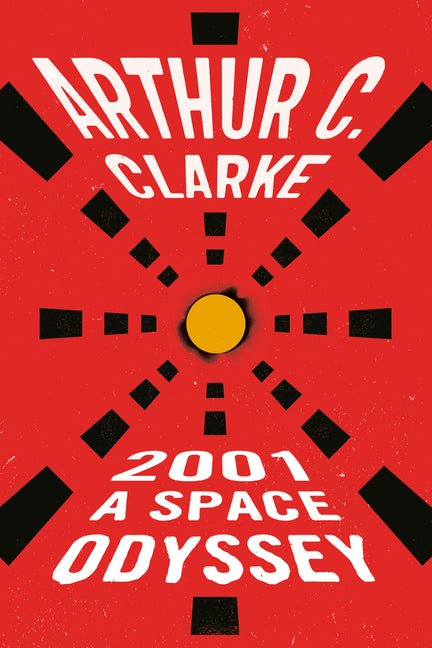Ace Books
2001: A Space Odyssey
Couldn't load pickup availability
Share
Book Details
ISBN:
9780451457998
EAN:
0451457994
Binding:
Mass Market Paperbound
Pages:
320
Authors:
Arthur C Clarke
Publisher:
Ace Books

"2001" the movie was a tour de force. Over thirty years after its release, HAL's "eye", HAL's voice, and the monolith are instantly recognizable, even to those who were not born when the movie was first released. Despite this instant recognition, how many people do you know truly understood the movie, especially the end?If you want a deeper understanding of the story, if you want to know why HAL did what he did, if you just want to know what that ending was about, or if you want to showoff for your friends by "knowing" what all that weird stuff was about, then I recommend you read this book. Even if you have read it before, I would encourage you to read the book again this year, because it is the year 2001."2001" is actually three relatively independent stories tied together by the mystery of the monoliths. The story begins several million years ago at the dawn of mankind. Actually, we are still little more than apes, and our ancestors are on the verge of extinction. The story follows one ape-man named Moon-Watcher and his interactions with an alien artifact. The story then jumps forward to modern times (which was roughly 35 years into the future when Clarke wrote the story), and we follow the story of Dr. Heywood Floyd and the discovery of an ancient alien artifact buried on the moon. Finally, we move a little further into time as Dave Bowman, Frank Pool, and their AI system named HAL voyage to Saturn (Jupiter in the movie).I both enjoyed and was saddened by Clarke's vision for our present day. In only a dozen years we went from the very first satellite (Sputnik) to putting men on the Moon. Now, over thirty years after that first moon landing, mankind cannot even escape low earth orbit. So, while Clarke's vision of our future three decades out missed the mark , I would argue the failure was ours and not his. Nevertheless, I found reading a vision of our present day that was written over thirty years ago exciting.The book, like the movie, is not exactly fast paced. It focuses heavily on the "science" in "science fiction," and the characters are never developed very much, and for these reasons I did not give it a full five stars. However, I still strongly recommend you read the book. It is, after all, 2001.
I promised myself that I would read this book before the end of 2001, and I did. I enjoy reading books set at specific dates in the future to see how much the author got right. The worst I can say about Clarke's vision of 2001 is that he failed to foresee the downfall of the USSR (even the CIA was unable to do that). OK, so he sees us as having regular flights to the Moon and a colony on the Moon. We have the technology to do so today--we just do not have the collective political will. Many of his predictions, however, feel right, even if they are not dead on. He has some great ideas for how to overcome the challenges of space, especially the lack of gravity (great when you realize that we had not yet flown a man to the moon when the book was first published). For instance, he describes a space toilet that spins to create an artificial gravity using centrifugal force so that you can get your business to fall in the right place (makes me wonder what the Shuttle astronauts do now).Aside from all the predicting-the-future stuff, it is a great story, some premium science-fiction. I was completely swept up by the idea that some extra-terrestrial life monkeyed (so to speak) with our species millions of years ago to start us down the road to intelligent life--and then set up a signaling device to let them know when we had arrived (the monolith on the Moon, for those of you who remember the movie). Clarke also does an excellent job of describing what it must be like to travel within our own solar system for the first time--the feeling of leaving our sun, our life-giver behind. And speaking of the movie, the book explains a lot that you do not quite get in the movie, so that is a bonus. It also raises some other questions not presented in the movie at all. While each stands alone as its own piece of work, the book and the movie really should be considered companion works.I removed a star from my rating because this book never reaches the depth and complexity of truely great science fiction. It just scratches the surface of a deeper story that you know is there. I assume that the sequels explore these themes more completely. Further, while the conflict between David Bowman and HAL is what most people remember from the movie, it actually plays a smaller role in the book, to the point where I did not get the sense of menace from HAL that I remember feeling from the movie. I actually felt sorry for HAL.Overall, though, a great book, and this edition has an entertaining memoir of Stanley Kubrick, his partner in making the film.
One of the best sci-fi series ever written.
Sir Arthur C. Clarke will definitely be missed. I actually read the Novel much later than when I watched the movie adaptation. After reading it, I was able to understand what the movie was trying to convey.
Perhaps the greatest of all sci-fi writers, this is one of Clark's greatest works. A wonderful look at what happens when we trust AI more than we trust people, and more besides that. True science fiction!


